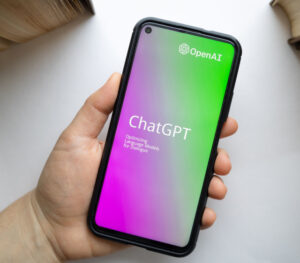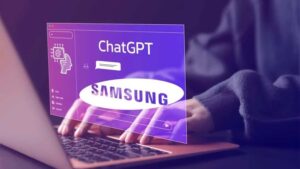Samsung appears to be joining the AI trend by creating its own alternative to ChatGPT. The company has recently limited the use of generative AI tools internally and is now investing significant resources into developing its own Large Language Model (LLM). Here are more details about this exciting development.
According to an exclusive report from Chosun Media, Samsung Research is dedicating substantial manpower and resources to advance AI at the organizational level. The project commenced on June 8 and is projected to complete its initial phase by the end of July.
The report further reveals that Samsung has temporarily restricted the utilization of GPU resources within the company. This decision is believed to be a strategic move to allocate all GPU resources towards training the upcoming AI model. Training an AI model with real-world data inputs demands significant GPU power, making this redirection of resources unsurprising. Officials from Samsung electronics have acknowledged the restriction, stating that all other in-house software development departments are currently barred from using GPUs.
However, it’s important to temper your excitement because Samsung intends to employ this upcoming model exclusively for internal purposes. Unfortunately, there are no plans for a commercial release. The primary applications of this AI model will be focused on language translation, documentation, and software development within Samsung.
The development of an AI LLM by Samsung is not unexpected, considering the organization’s ample resources and motivations. A recent incident involving leaked internal data while using ChatGPT likely prompted the urgent need for Samsung to develop its own AI-based LLM solution. The company has set a two-month deadline to fully deploy the initial version of this AI model.
As of now, concrete information is scarce, and it’s important to approach this development with some skepticism. However, as Samsung’s self-imposed deadline approaches, we anticipate more details will emerge. Stay tuned for further updates.
In recent years, OpenAI’s ChatGPT has gained significant attention and popularity as a language model capable of generating human-like responses to text-based inputs. However, despite its advancements, ChatGPT still has several limitations that hinder its widespread adoption. Recognizing these limitations, Samsung has embarked on developing an alternative to ChatGPT that aims to overcome these challenges and provide a more refined and capable AI-powered chatbot experience.
What is ChatGPT?
ChatGPT, developed by OpenAI, is an advanced language model that uses deep learning techniques to generate human-like text responses. It leverages the power of the Transformer architecture and has been trained on a vast corpus of text data to learn patterns, grammar, and semantic meaning. ChatGPT has been widely used in various applications, including customer support, content generation, and virtual assistants.
Limitations of ChatGPT
While ChatGPT has demonstrated remarkable capabilities, it suffers from certain limitations that hinder its overall effectiveness and reliability. These limitations include:
Lack of factual accuracy
ChatGPT primarily relies on statistical patterns present in the training data, which can sometimes result in the generation of responses that are factually incorrect or misleading. Since it lacks true understanding and reasoning capabilities, it may provide inaccurate information, especially in domains where factual accuracy is crucial.
Vulnerability to biases
Language models like ChatGPT can unintentionally perpetuate biases present in the training data. This can lead to biased or unfair responses, reinforcing stereotypes or discrimination. Although efforts have been made to mitigate these biases, they still persist to some extent.
Inability to handle complex queries
ChatGPT may struggle with understanding and effectively responding to complex queries or nuanced requests. It often produces generic or ambiguous responses when faced with intricate questions, which can be frustrating for users seeking specific and detailed information.
Samsung’s alternative to ChatGPT
Recognizing the limitations of ChatGPT, Samsung has initiated the development of an alternative chatbot that aims to address these challenges. Samsung’s research and development teams have been working tirelessly to create a more advanced and robust language model that offers an enhanced user experience. The alternative to ChatGPT is designed to overcome the limitations of its predecessor while introducing innovative features and improvements.

Research and development efforts
Samsung’s research and development teams have leveraged state-of-the-art techniques in natural language processing (NLP) and deep learning to create an alternative that goes beyond traditional language modeling. They have focused on training the model on a diverse range of data sources, including reputable and reliable information repositories, to improve the factual accuracy of responses.
Goals and objectives
Samsung’s alternative to ChatGPT aims to provide users with highly accurate and relevant information while maintaining a conversational and user-friendly interface. It seeks to reduce biases in responses by incorporating advanced algorithms that identify and mitigate potential biases present in the training data.
Key features and improvements
Samsung’s alternative chatbot boasts several key features and improvements over ChatGPT. These include:
- Enhanced factual accuracy: By incorporating reputable data sources, Samsung’s alternative can provide users with more accurate and reliable information, reducing the likelihood of misleading responses.
- Reduced biases: Advanced algorithms and ethical considerations are employed to minimize biases in responses. By actively identifying and rectifying biases, Samsung’s alternative strives to provide fair and inclusive interactions.

- Improved handling of complex queries: The alternative chatbot has been trained to handle complex queries more effectively, providing detailed and specific responses. It leverages advanced reasoning and comprehension techniques to understand nuanced requests and provide relevant information.
Advantages of Samsung’s alternative
Samsung’s alternative to ChatGPT offers several advantages over existing language models, making it a promising contender in the AI chatbot landscape.
One of the notable advantages is its enhanced factual accuracy. By integrating reputable data sources and implementing stringent fact-checking mechanisms, Samsung’s alternative aims to provide users with reliable and accurate information, reducing the chances of misinformation.
Additionally, Samsung’s alternative actively addresses the issue of biases. By recognizing and mitigating biases in responses, it ensures fair and equitable interactions with users from diverse backgrounds, fostering inclusivity.
Furthermore, the alternative chatbot’s improved handling of complex queries is a significant advantage. Users can expect more precise and detailed responses to their inquiries, enabling a more meaningful and satisfying user experience.
Potential impact on the AI landscape
Samsung’s alternative to ChatGPT has the potential to make a substantial impact on the AI landscape. By addressing the limitations of existing language models, it sets a precedent for increased accuracy, reduced biases, and improved user satisfaction.
The introduction of Samsung’s alternative could also encourage other companies and researchers to prioritize ethical considerations and strive for more refined and responsible AI systems. This collective effort can contribute to the development of AI models that not only excel in performance but also prioritize fairness, inclusivity, and factual accuracy.
Challenges and future prospects
While Samsung’s alternative shows promising advancements, there are still challenges to overcome. Developing a language model that caters to diverse user needs, ensures complete factual accuracy, and effectively handles complex queries is a complex task that requires ongoing research and development.
However, with Samsung’s commitment to innovation and the collaboration of experts in the field, the future prospects for their alternative chatbot are promising. The continued refinement of the model and integration of user feedback will contribute to its evolution and eventual release.
Conclusion
Samsung’s endeavor to develop an alternative to ChatGPT reflects the continuous pursuit of advancements in AI-powered chatbot technology. By addressing the limitations of existing language models, Samsung aims to offer an alternative that prioritizes factual accuracy, reduces biases, and excels in handling complex queries. The potential impact of Samsung’s alternative extends beyond its own application, encouraging the development of responsible and ethical AI systems.
As the development progresses, users can look forward to a more reliable and efficient AI chatbot experience that enhances interactions, fosters inclusivity, and provides accurate and informative responses.
FAQs
Q: What is ChatGPT? A: ChatGPT is an advanced language model developed by OpenAI, capable of generating human-like responses to text-based inputs.
Q: How does Samsung’s alternative differ from ChatGPT? A: Samsung’s alternative aims to overcome the limitations of ChatGPT by offering enhanced factual accuracy, reduced biases, and improved handling of complex queries.
Q: When will Samsung’s alternative be available? A: The release date of Samsung’s alternative has not been officially announced. However, ongoing research and development suggest that it will be available in the near future.
Q: Can Samsung’s alternative be used for commercial purposes? A: Yes, Samsung’s alternative is intended for commercial use, enabling businesses to leverage advanced chatbot capabilities for customer support, content generation, and more.
Q: How can I access Samsung’s alternative? A: To access Samsung’s alternative, visit to get access and explore its features and capabilities.